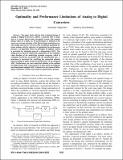Optimality and performance limitations of analog to digital converters
Author(s)
Osqui, Mitra; Megretski, Alexandre; Roozbehani, Mardavij
DownloadMegretski_Optimality and performance.pdf (326.2Kb)
PUBLISHER_POLICY
Publisher Policy
Article is made available in accordance with the publisher's policy and may be subject to US copyright law. Please refer to the publisher's site for terms of use.
Terms of use
Metadata
Show full item recordAbstract
The paper deals with the task of optimal design of Analog to Digital Converters (ADCs). A general ADC is modeled as a causal, discrete-time dynamical system with outputs taking values in a finite set. Its performance is defined as the worst-case average intensity of the filtered input matching error. The design task can be viewed as that of optimal quantized decision making with the objective of optimizing the performance measure. An algorithm based on principles of optimal control is presented for designing general m-dimensional ADCs. The design process involves numerical computation of the candidate value function of the underlying dynamic program, which is computed iteratively, in parallel with the quantization law. A procedure is presented for certifying the numerical solution and providing an upper bound for performance of the designed ADC. Furthermore, an exact analytical solution to the optimal one-dimensional ADC is presented. It is shown that the designed one-dimensional optimal ADC is identical to the classical Delta-Sigma Modulator (DSM) with uniform quantization spacing.
Date issued
2010-12Department
Massachusetts Institute of Technology. Department of Electrical Engineering and Computer Science; Massachusetts Institute of Technology. Laboratory for Information and Decision SystemsJournal
Proceedings of the 49th IEEE Conference on Decision and Control (CDC), 2010
Publisher
Institute of Electrical and Electronics Engineers (IEEE)
Citation
Osqui, Mitra, Alexandre Megretski, and Mardavij Roozbehani. “Optimality and Performance Limitations of Analog to Digital Converters.” Proceedings of the 49th IEEE Conference on Decision and Control (CDC), 2010. 7527–7532. © Copyright 2010 IEEE
Version: Final published version
ISBN
978-1-4244-7745-6
ISSN
0743-1546